Intel Core i7-11700K Review: Blasting Off with Rocket Lake
by Dr. Ian Cutress on March 5, 2021 4:30 PM EST- Posted in
- CPUs
- Intel
- 14nm
- Xe-LP
- Rocket Lake
- Cypress Cove
- i7-11700K
Gaming Tests: Final Fantasy XIV
Despite being one number less than Final Fantasy 15, because FF14 is a massively-multiplayer online title, there are always yearly update packages which give the opportunity for graphical updates too. In 2019, FFXIV launched its Shadowbringers expansion, and an official standalone benchmark was released at the same time for users to understand what level of performance they could expect. Much like the FF15 benchmark we’ve been using for a while, this test is a long 7-minute scene of simulated gameplay within the title. There are a number of interesting graphical features, and it certainly looks more like a 2019 title than a 2010 release, which is when FF14 first came out.
With this being a standalone benchmark, we do not have to worry about updates, and the idea for these sort of tests for end-users is to keep the code base consistent. For our testing suite, we are using the following settings:
- 768p Minimum, 1440p Minimum, 4K Minimum, 1080p Maximum
As with the other benchmarks, we do as many runs until 10 minutes per resolution/setting combination has passed, and then take averages. Realistically, because of the length of this test, this equates to two runs per setting.
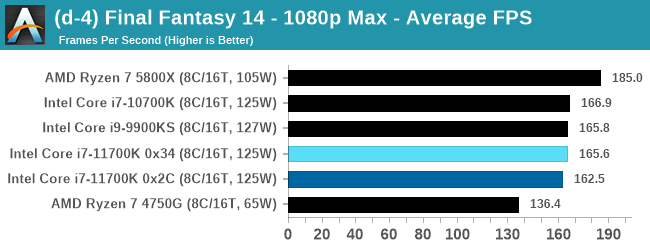
| AnandTech | Low Resolution Low Quality |
Medium Resolution Low Quality |
High Resolution Low Quality |
Medium Resolution Max Quality |
| Average FPS | 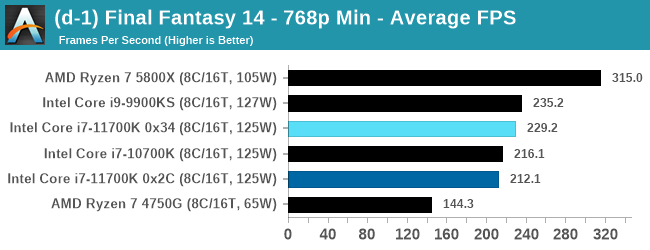 |
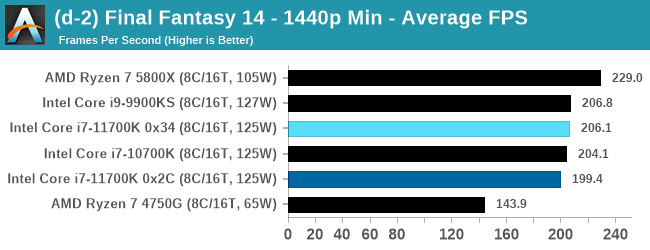 |
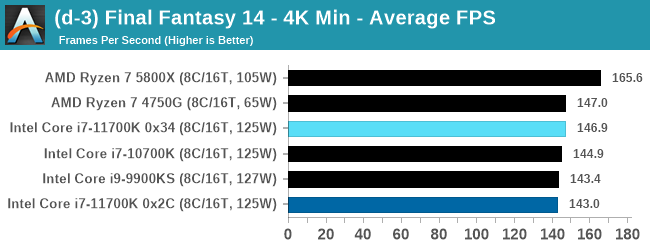 |
 |
As the resolution increases, the 11900K seemed to get a better average frame rate, but with the quality increased, it falls back down again, coming behind the older Intel CPUs.
All of our benchmark results can also be found in our benchmark engine, Bench.


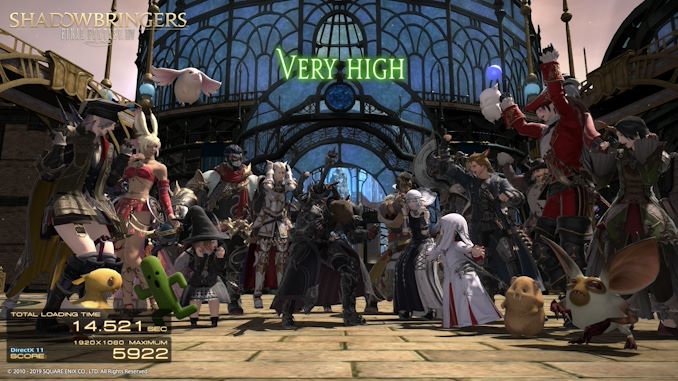








541 Comments
View All Comments
Shorty_ - Monday, March 8, 2021 - link
I'm not sure if you're being wilfully obtuse or ignorant.. the only reason Skylake is even remotely in the game is that intel's 14nm is refined enough to allow them to push raw clock speeds to the moon. Do you not recall how awful Ice Lake was because it couldn't clock? TGL is starting to clock a bit better but it's still pretty damn close. This is on 10nm "superfin" which is ~= TSMC N7(P).So Intel don't have some magic engineering pixie dust that would propel them beyond AMD if they were on the same node.
Thesubtlesnake - Saturday, March 6, 2021 - link
Intel already have process equivalent to 7nm – 10nm SF. And they already designed a new architecture on it: Tiger Lake. And Zen 3 is perfectly competitive with Tiger Lake.Teckk - Friday, March 5, 2021 - link
Ultimately the latest desktop processors from Intel doesn’t perform well against AMD that’s what it is.They chose to release it on 14 nm as their 10nm was still work in progress. The numbers have meaning and not your conjecture about Intel using TSMC advanced node- it’ll be compared whenever that happens, with numbers.
Cooe - Saturday, March 6, 2021 - link
*Zen 3hfm - Saturday, March 6, 2021 - link
But we have to live in reality that they don't even have 10nm ready for desktop. Fantasies about creating an alternate reality where their core architecture exists on a smaller node for desktop are just that, fantasies. The reality is AMD clearly has the far better product right now aside from niche edge cases.I still agree with the conclusion though that given current circumstances, get what you can get if you need to upgrade or build new. But the reality there seems like the 5800X is available at MSRP in-stock at multiple storefronts.
blppt - Friday, March 5, 2021 - link
A chip that is just released, the best Intel currently has to offer for the mainstream consumer, can't match a chip that has been out for months. While using more power.Thats not a good look for Intel. I hope the 11900K (or whatever they're going to call it) at least matches the 5900X in games.
This is the first time in a long time, with generations of chips current, that I cannot think of a single reason to recommend Intel's latest and greatest over AMD.
terroradagio - Friday, March 5, 2021 - link
The 11900k has always been what should be compared to the 5900x anyway. Not the i7-11700k.blppt - Saturday, March 6, 2021 - link
The point being, the 11700k doesn't even catch the 5800X, which has been out for a few months already. Given that this was supposed to be Intel's "response to Zen 3", its pretty disappointing.Fulljack - Saturday, March 6, 2021 - link
the only thing that could save Rocket Lake-S are availability and price. otherwise just get Ryzen 5000 processors.SaturnusDK - Saturday, March 6, 2021 - link
Availability of Ryzen 5000 except 59xx parts is already a non-issue. You can get 5600X with a few days delay at worst, and 5800X is in abundant stock pretty much everywhere.The key is price, especially the platform price because Intel MBs are generally more expensive. On top of that you absolutely need a larger cooler, and most likely also need a beefier PSU for the Intel CPUs, so the CPU price for the intel parts have to be substantially lower than a performance equivalent AMD part to be competitive. And given the history of intel that seems very unlikely to happen.